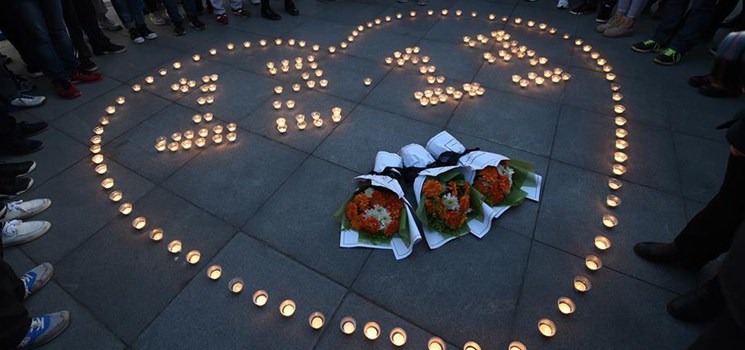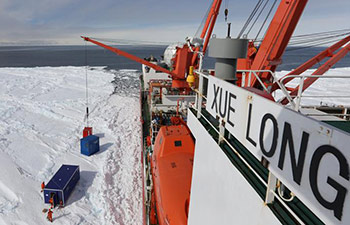by Peter Barker, Gui Tao
LONDON, Dec. 13 (Xinhua) -- Despite "extraordinary concessions" from the British as they negotiate leaving the European Union (EU), the outcome of Brexit remains unclear, according to a leading commentator.
The progress made so far in "divorce" talks between Britain and the EU has seen the British side make substantial concessions, according to the Financial Times associate editor and chief economics commentator Martin Wolf.
BRITISH CABINET ACCEPTS SUBSTANTIAL COMPROMISES
"The most important thing that has happened ... is that the Brexiters, the leading Leave supporters in the Cabinet, have finally accepted very, very substantial compromises by the British government," Wolf told Xinhua in a recent exclusive interview.
British Prime Minister Theresa May and European Commission President Jean-Claude Juncker reached an agreement to progress to the next phase of the Brexit negotiations last Friday, after a frantic week of to-ing and fro-ing following months of talks between the two parties.
The EU's chief negotiator Michel Barnier said "real, genuine progress" had been made in each of the priority areas: expatriates' rights, Britain's border with the EU, the land border between Ireland and Northern Ireland, and a financial deal.
For Wolf this progress in talks to the second stage had been secured by substantial British concessions.
A major issue in the Brexit referendum campaign in the run-up to the June 2016 vote had been Britain's net contribution to the EU, which Leave campaigners had claimed was 350 million pounds (about 466 million U.S. dollars) per week.
This money could be reclaimed, and used on entirely British projects once Brexit had happened, the Leave supporters had claimed.
Wolf said this figure was dwarfed by the financial "divorce" agreement May and Juncker had agreed on, which would cover outstanding British obligations to the EU budgets.
British officials said this was worth between 35-39 billion pounds (about 47-52 billion dollars), although their EU counterparts have not published their estimate.
"So that is a very very big concession," Wolf said.
"We have also given pretty large concessions on the rights of people, in particular, as I understand the agreement that has been reached, British courts will decide on the rights of EU residents in the UK they will do so in the light of European Court of Justice (ECJ) judgments, they will use the ECJ judgments as a reference point. That is also a pretty big concession."
Leave campaigners had wanted to reclaim full British sovereignty from the shared arrangements that EU membership demanded, but Wolf believed that the agreement to allow ECJ influence on British courts was a surrender of some sovereignty.
Cases will be adjudicated in British courts, but could be referred to the ECJ for eight years after the Brexit date.
"It means that the ECJ will continue to have sway," Wolf said.
IRISH BORDER STUMBLING BLOCK
Negotiations between the EU and Britain had been taken right to the final deadline last Friday as top leaders and their diplomats worked overnight to produce an agreement that tackled the problem of the Ireland-Northern Ireland border.
This is Britain's only land border with the EU, and the Good Friday Agreement of 1998 between Ireland, Britain and representatives of the Northern Ireland communities had removed the physical and military barriers on the border as part of the conclusion of a peace process.
This had ended 30 years of insurgent warfare in Northern Ireland, commonly known as The Troubles.
Since then there has been no return to the scale of conflict between the British state and radical groups seeking a reunion with Ireland and other groups fighting to keep Northern Ireland in Britain.
But the return of a hard border with customs checks and border points would divide the island of Ireland once more, splitting communities and the market for goods and services and political leaders feared it would reignite The Troubles.
Wolf said that the solution put forward in the May-Juncker agreement in Brussels revealed the British government's weak negotiating hand.
The leaders agreed that "in all circumstances" Britain will continue to ensure unfettered access for Northern Ireland's businesses to the whole of the British internal market, keeping the province connected to Britain.
But the agreement also said that there would be full alignment with EU single market and customs unions rules between Northern Ireland and Ireland.
"Most remarkably, the British government has given a commitment on the Irish question which seems to imply, although it is not completely clear, if no other way is found to avoid a customs border inside Ireland we will have regulatory alignment between Northern Ireland and Ireland," he said.
"Since we are also committed to avoiding a regulatory border within Britain, that would seem to mean regulatory alignment between Britain and the EU," said Wolf.
Maintaining that alignment would imply that Britain would accept EU regulations but have no say in how those regulations were drawn up, if it did leave the EU, although that could be tempered with the details of a trade treaty.
"If that were true that is an extraordinarily big concession because it amounts to saying that relevant regulations ... would seem to cover at least product and possible service standards, would remain aligned with the EU which would be a massive derogation from British sovereignty -- which after all is the reason for voting for Leave," Wolf said.
"What it confirms, as I have been arguing throughout, is this isn't really a negotiation at all -- the EU has the upper hand, the idea that we are negotiating was an illusion," Wolf said.
Wolf said that this meant Britain could either accept EU terms or it will leave without a deal.
WHAT COMES NEXT IS UNCERTAIN
Britain is scheduled to formally leave the EU at the end of March 2019. To give time for all the remaining 27 EU nations to have their say on the deal, it probably needs to be completed by late 2018 at the latest.
The deadline is very tight, but both parties can give themselves time if they can agree to a transition period, in which Britain retains EU rules but formally leaves the 28-nation bloc.
"My assumption is that there will be agreement, though it might be difficult, of a so-called transition of some period, mostly talked about for two years, could be longer, during which nothing changes. We would remain in the single market and the customs union," Wolf said.
Wolf said staying in the single market and leaving the EU was possible for a transition period, but staying in the customs union posed legal difficulties, as he believed it was only possible for members of the EU to be in it.
"You can have a customs agreement with the EU, which Turkey has, but that is not quite the same thing. So if you want to remain in the customs union you would have to stay in the EU and that means the simplest thing to do is to postpone our date of departure to March 2021," said Wolf.
"Then the question arises -- what is the final point, because they will have to discuss and finally to implement the question of what our final arrangement will be."
TWO CHOICES FOR UK
Models of what Britain's relationship with the EU could look like after Brexit have crystallized for the time being around two scenarios -- the Canadian and the Norwegian one.
The Norwegian scenario would see Britain strike a deal that would put it into the European Economic Area (EEA), giving it access to the customs union and the single market, but depriving it of voting rights and requiring payments into the EU to continue.
The Canadian scenario would see Britain adopt a comprehensive and bespoke trade agreement with the EU, modeled on the Comprehensive Economic and Trade Agreement (CETA) deal between Canada and the EU. Britain would be able to negotiate its own trade deals. The CETA deal does not contain any agreement on financial services, a key sector for the British, and this would have to be dealt with in negotiations.
Wolf saw no certainty of direction yet from the British leadership, with May having to balance her stance and policy direction between the Leave and Remain camps of her party.
May also needs to listen carefully to the demands of the Northern Ireland Democratic Unionist Party (DUP), who are pro-Leave, on whom she relies to keep her minority government in power after having lost her House of Commons majority in the general election earlier this year.
"The government is unclear but chancellor of the exchequer Philip Hammond and Brexit secretary Davis want what they call Canada plus plus plus, which is essentially the Canada agreement plus what is called enhanced regulatory equivalence."
"This is an arrangement which allows Britain to trade with the EU in services, as if almost we were inside the single market. The EU has generally said, and I have spoken to officials there, that that is impossible and so the big argument will be whether the Canada plus plus plus is a feasible option."
The outcome is uncertain, but Wolf is pessimistic and believes that a Canada scenario is unlikely because "the EU will get its way," as he believes it has done in the negotiations so far.
The complexity of negotiations in the coming year is daunting. In addition no nation has ever left the EU, so there is no precedent.
"At the moment it seems the British government has put itself into an impossible situation. The reason that it has done so is because it could not proceed at all without making such concessions," Wolf said.
"All of which shows the vote on Brexit was ill considered, ill defined, the meaning of it was never properly understood and we are now in an absolutely absurd position -- where this will end I don't know."

















